In October of 2015, Jeffrey Lacasse and Jonathan Leo published an article in The Behavior Therapist about the Chemical Imbalance Theory of Depression. In the article we criticized Dr. Pies’ characterization of the theory. Dr. Pies was upset and immediately had Mad in America post a letter about our paper. In his letter Dr. Pies stated,
“Citing information properly disclosed by me over a decade ago, Lacasse & Leo allege that I was “paid to help [pharmaceutical companies] promote their products…” This is categorically false. The allegation by Lacasse & Leo was not based on any direct knowledge of my professional or contractual arrangements dating back to 2003. Never, at any time, have I accepted any monies from pharmaceutical companies (or anyone else) with the intent or purpose of promoting their products. Nor have I ever had any ongoing financial relationships with any pharmaceutical companies.”
And,
“A detailed rejoinder to Lacasse & Leo will appear in the winter issue of “The Behavior Therapist,” where the Lacasse & Leo article originally appeared. However, I respectfully request that you run a correction on your website as soon as possible; e.g., by posting this communication. I consider this a matter that impinges on my professional reputation, and I reserve all rights in pursuit of a just resolution.”
The Behavioral Therapist recently published his letter, and Lacasse and Leo’s reply:
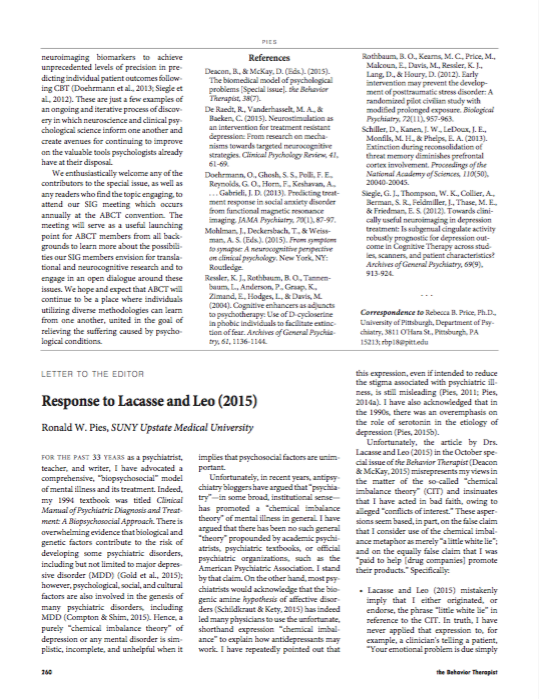
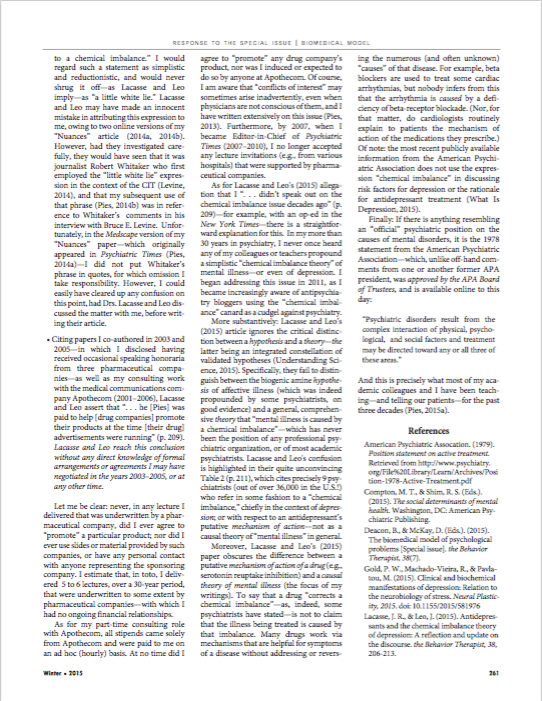
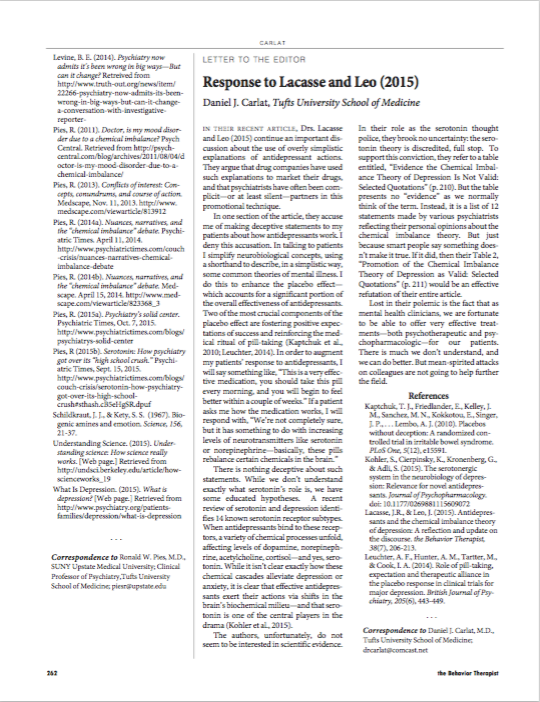
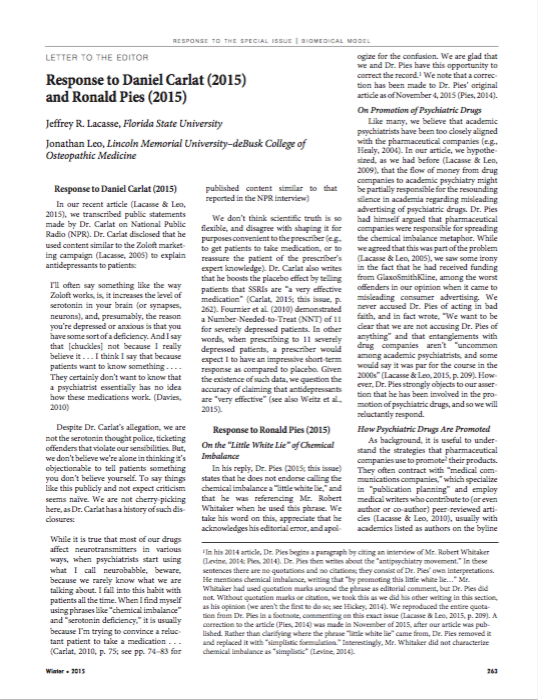
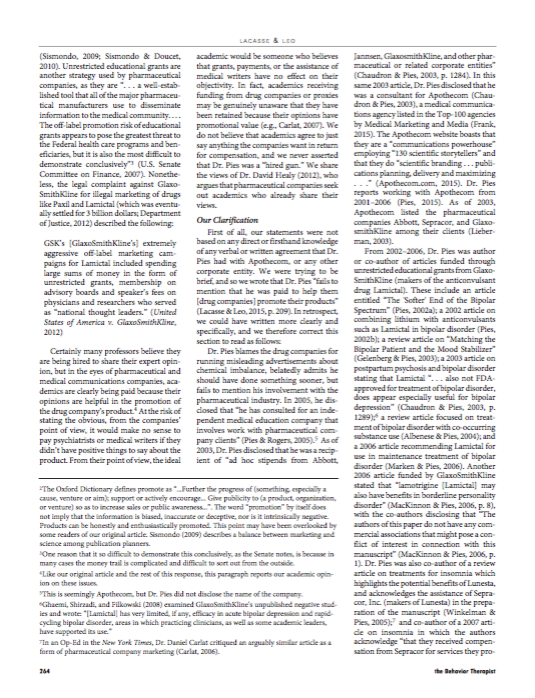
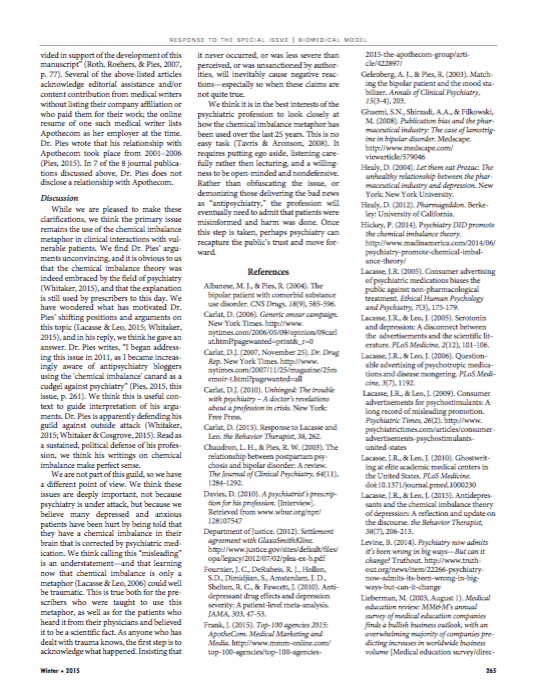
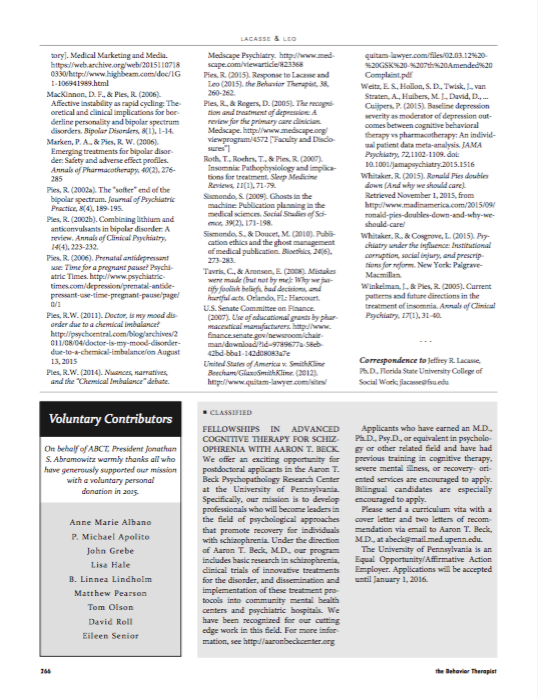












Although it was hard to read through the barely-visible text (can anything be done about that?), this is an excellent response by Leo and Lacasse to the guild-motivated defense of psychiatric practices by Pies and Carlat.
Particularly interesting to me were these things:
1) To make his points, Pies continues to rely on the myth that discrete “psychiatric disorders” like major depression exist and have validity. They don’t. There is no one major depression out there discrete from other behavioral/emotional/thinking problems, nor is “it” targetable by specific drugs. It’s a myth. We need to keep calling Pies and his ilk out on this point again and again and again. You can’t just pretend that your scientific pseudo-categories have validity, giving reference to these pseudo-categories, and expect for it to be totally accepted. That ain’t happening baby…
2) Carlat essentially lied that psychiatrists are able to offer “very effective treatments – (both psychological and) and psychopharmacologic (meaning drugs)”… when Leo and Lacasse came back with the data showing that antidepressants are only more effective than placebos about 10% of the time (for 1 out of 11 clients)… wow that looks bad on Carlat. Very damning. How many would choose to take a pill that was only more effective than placebo about 10% of the time?… the main point of the drugs is clearly to make money for drug companies and corporate execs and psychiatrists, not to benefit most clients, which they don’t.
3) Pies said there is “overwhelming evidence that biologic and genetic factors contribute to the risk of developing certain psychiatric disorders” (like MDD). This is bullshit. Firstly there are no discrete psychiatric disorders that can be evaluated that way. As Brian Koehler says, the human genome did not evolve to reify DSM categories. Second, twin research is fatally flawed and massively overestimates genetic influences on behavior (Jay Joseph, Jonathan Leo write about this). Furthermore, twin research fundamentally misunderstands that genes do not do or contribute anything alone; they are a potential script that is acted on by the environment. Pies needs to get up to date on epigenetics.
As for biological factors being a major contributor to “major depression”, there’s no evidence of that either. That’s the whole point of this article, that we have no evidence that neurotransmitter deficits are causing anything and that doctors should stop misleading the public about it. So why does Pies start his article with more propaganda about biological factors causing “major depression” (as opposed to mini depression)? Again, to sustain the myth that problems of behavior and emotions are medical diseases and to promote psychiatry as a real medical discipline, when it is not.
The point of Carlat and Pies’ responses were to defend the profit machine of corporations and psychiatrists from loss of market share. In reality, 80-90% of the help clients of Pies/Carlat get is from the placebo effect; the drugs’ main function is not to help (1 out of 10) clients, but to support Pies/Carlat making hundreds of thousands of dollars a year and having a perceived high social status as antidoctors. Without medicalization of the non-medical, they would be poor therapists making $50,000 a year. That’s what his boils down to, as usual, money and power for the psychiatrists, and very little of real help for the “patients.” Period.
Report comment
BPDTransformation, B.A,
http://www.madinamerica.com/wp-content/uploads/2015/11/Behavior-Therapist-Oct-2015.pdf
At the beginning of the article posted at MIA there is a link to the publication including this and other articles that I have cited above. Hope this helps.
Report comment
Thank you Donna, I did previously read this Behavior Therapist magazine when it came out. It’s a good issue.
Report comment
One of the (many) things that is upsetting is that Dr. Carlat justifies telling patients that antidepressants are effective in order to enhance the placebo effect. Frankly, I can possibly see making that argument if antidepressants were benign drugs. So to tell a patient that taking a pill composed of sugar will help them may have some justication. I’m really not sure. But it is malpractice to tell a patient that a drug is effective when its side effects include sexual dysfunction, insomnia, weight gain, possible increase in suicidal ideation, and who knows what else. Does the good doctor inform his patients that trying to get off the drug if they do have these adverse effects could be problematic? The arrogance of Dr. Carlat’s position is stunning.
Report comment
Drs. Leo and Lacasse, since you’re “taking a critical look at the evidence for the biological basis of mental disorders.” I think it’d be relevant to such an inquiry, for you to also explore the evidence for the iatrogenic basis of today’s “mental disorders.”
For example, today’s “bipolar” treatments recommendations encourage combining the antidepressants, antipsychotics, and benzos. But all doctors should recall from medical school that combining these drug classes is dangerous, since combining them is known to result in anticholinergic toxidrome.
https://en.wikipedia.org/wiki/Toxidrome
And, the central symptoms of neuroleptic induced anticholinergic intoxication syndrome (from drugs.com): “memory loss, disorientation, incoherence, hallucinations, psychosis, delirium, hyperactivity, twitching or jerking movements, stereotypy, and seizures.” Are indistinguishable from the positive, or as described in my medical records, the “classic symptoms of schizophrenia,” to today’s doctors.
And not only are the neuroleptics, the “gold standard treatment” for “schizophrenia,” able to create the positive symptoms of that hypothesized illness, all by themselves. But the neuroleptics can also create the negative symptoms of “schizophrenia,” via neuroleptic induced deficit syndrome.
http://www.madinamerica.com/2016/02/researchers-call-for-reappraisal-of-adverse-mental-effects-of-antipsychotics-nids/
And, of course, since neither anticholinergic intoxication syndrome, nor neuroleptic induced deficit syndrome, are billable DSM disorders, and the doctors want to get paid. These drug induced illnesses are no doubt almost always misdiagnosed by today’s medical community, as any one of the “psychotic” disorders.
Thank you for the work you are doing, and I do hope you will consider looking into the iatrogenic effects of today’s psychiatric industry’s drug treatment recommendations, and how these correlate with the theorized “biological” DSM disorders. Especially given the enormous number of American children who have had the adverse reactions of the antidepressants and ADHD drugs misdiagnosed as “bipolar.”
Report comment
Hopefully reproducing eye-straining PDF’s will not become standard procedure here.
Report comment